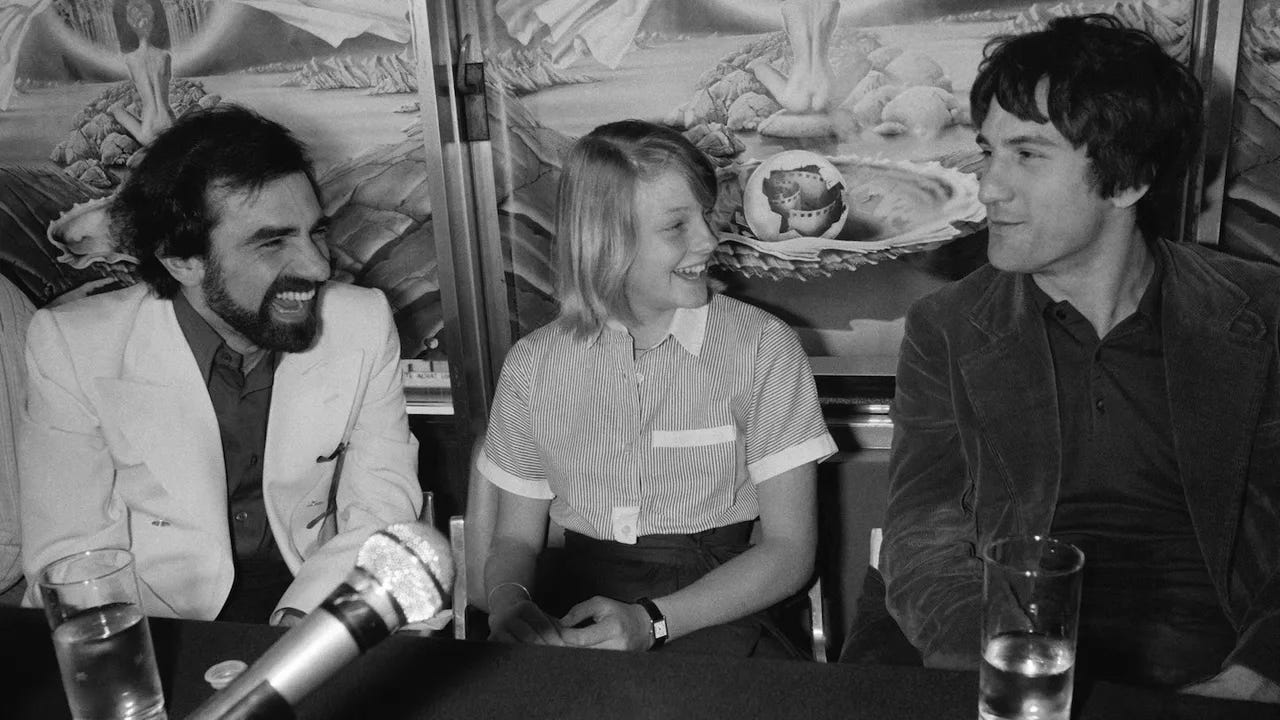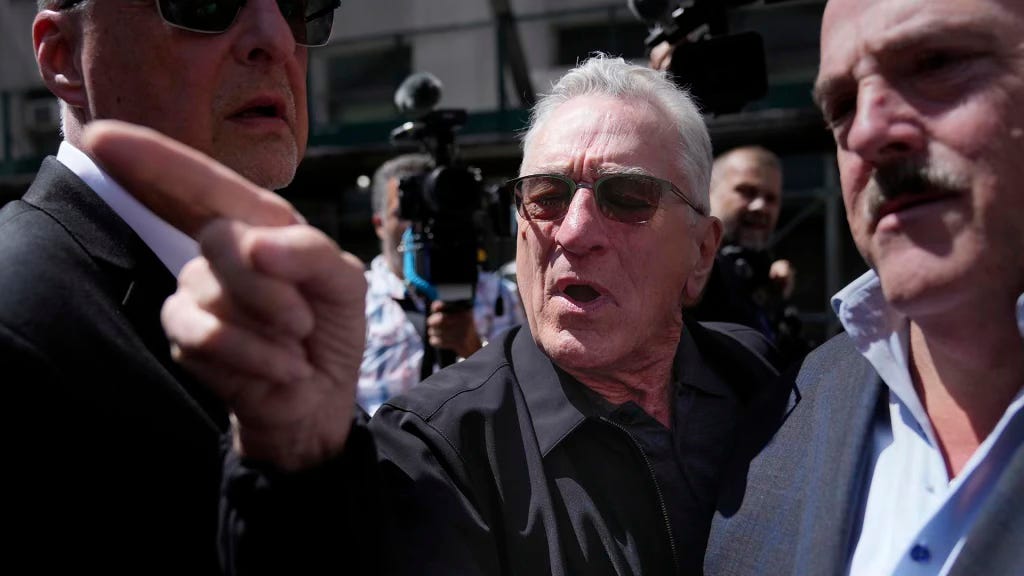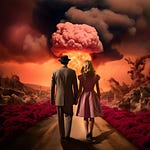[This is my first try at a video of my podcasts - let me know what you think. The text is below]
What did Robert De Niro think when he heard the news that a loser on the fringe shot President Trump? Did he think, “Good. I’m glad someone finally did.” Did he pause and contemplate the near-death of a former president? Did he, like so many others on the Left, wish the shooter had better aim?
It didn’t matter to Thomas Matthew Crooks whether the target was Joe Biden or Donald Trump. He probably never watched Taxi Driver, and the only thing he knows about Robert De Niro is the anti-Trump memes that flood the MAGA zone, making fun of the aging actor. Everybody sees those. No, all that mattered to him was that people remembered his name.
But still, you have to wonder, in the moments immediately following the shooting, what De Niro must have thought, considering he once played Travis Bickle in Taxi Driver, a guy a lot like Crooks— a lonely invisible man who would be written off as an incel today—the very definition. Not many people go to the trouble of assassination attempts of political figures. Thomas Matthew Crooks now joins that very short list.
What made the Trump assassination attempt so jarring was that we all watched it on live television. We saw something that should have shocked us all out of our partisan stupor. It should have meant the end of our Cold Civil War, fought mostly on Twitter for control of the media narrative.
But it was a test and I’m afraid we failed. We moved on too quickly. We didn’t even talk about what it meant for our national unity. With Reagan, it was big news. Any political assassination was. But what’s happened to us now? The media machine was back to feeding the hungry beast of rage against this one man.
It was a grim reminder that we’re not only living Orwell’s 1984, but we’re living Sydney Lumet’s Network too. When they were done with Howard Beale, they were done.
Taxi Driver is one of the greatest films ever made. There is no question about that. Hollywood doesn’t make movies like that anymore. They can’t. There is no room for them. Hollywood is so closely married to the Democratic Party that the Obamas have a deal with Netflix. George Clooney was one of the most influential people in pushing Joe Biden aside to install the younger woman of color, Kamala Harris.
That means everything is not only politics but politics that support one political party, a party that has control of almost everything, a party that must always project a utopian vision for society, a Woketopia.
Orwell knew. Paddy Chayefsky knew.
So much of what we watch now has been scrubbed clean of any perceived offense against any one group. The result is a bland homogenization of art. Everything looks exactly the same—types of people represent different groups so as not to leave one marginalized person behind.
It has a disorienting effect because we’re never sure what we’re watching or where we are in time. History has been erased and modulated to be less offensive, easier to accept, not confrontational. Is this a story, or is it propaganda?
Paul Schrader, Martin Scorsese, and so many of the best filmmakers of the 1970s were part of the counterculture revolution. It was a renaissance of creativity born out of a society rooted in traditional religion.
All of these years later, the Boomers are preparing to go gently into that good night. They don’t want to move fast and break things. They want to make sure their time on this planet was useful. So they’ve tinkered with their utopian diorama via Hollywood. Have we achieved perfection? Is everyone now equal? One more step to go, the first female of color president.
What stands in their way? The guy who just got shot three weeks ago.
Whatever Hollywood has become, it has fused with the government, leaving very little room for dissent or subversive thought. That’s why a Taxi Driver could not be made today. It isn’t just that Taxi Driver is full of scenes that would be considered overtly racist.
Black men are depicted as thugs and gangsters. The film is filled with politically incorrect slurs. Jodie Foster plays a 12-year-old prostitute who dresses provocatively and sleeps with her pimp, played by Harvey Keitel.
One scene is disturbing and would be too upsetting for today’s audiences. Travis Bickle shoots an armed robber in a liquor store. But it’s after Travis leaves that it gets really bad as the shopkeeper begins hitting the limp, dead body with a baseball bat.
And if you talk about those scenes as being essential to the film, you’ll be called a racist. Somehow it always gets back to nervous white people afraid of being called out and losing everything.
But it’s also that Taxi Driver is such a beautiful reveal of the hypocrisy on the Left. Paul Schrader or director Martin Scorsese wouldn't see it that way, but looking back on the film from the lens of today, we see what Travis calls “filth and scum” all around him. Nothing is solved, and in fact, it’s not even seen.
Only Travis sees what life in New York is really like.
Taxi Driver’s moral compass points in the right direction. Travis Bickle is an early prototype for the exact kind of shooter that tried to take out Donald Trump. He’s a loner, addicted to porn, a nobody who thinks getting a gun and doing something big will make him a somebody.
It doesn’t play out as Travis wants it to. He wants to assassinate presidential candidate Palentine. He wants to be a bad guy to get revenge not just on the woman who spurned him but on all of society. Palentine was a politician—a Democrat, by the looks of it—and politicians sent Travis Bickle to Vietnam—politicians who exist in another world, far away from the reality of the streets of New York City.
He sees the crime, the hookers, the poverty, the violence. He sees the world left behind by politicians. Scorsese contrasts this with the idealized world of Betsy, played by Cybil Shephard. Palentine’s office and Betsy’s world are one cool remove from what Travis sees. That’s probably why she catches his eye.
But Travis doesn’t belong in that world, though he tries for a time. He takes her on a date, which is awkward and strange. She seems drawn to him like good girls were drawn to dark and dangerous men back then —think: the Manson family. He takes her “to the movies,” but Travis doesn’t live the way normal people do, so he takes her to a porn flick. That freaks her out, and her “walk on the wild side” over.
Today, Hollywood is Palentine’s office. It is a world away from the reality of everyday life, and they somehow believe they can solve the problems for the rest of us. Today, Travis Bickle would get no sympathy from viewers. He would be judged and placed in a specific category, in the unseen world.
Taxi Driver is a riveting film from the first second. We are fascinated by this guy, not just because his performance is one of the best ever by an actor, but because we wonder what he will do next. He seems pulled in two different directions, good and evil. That’s textbook Paul Schrader, of course, but we didn’t necessarily know that back then.
Travis practices becoming a badass. He buys a stockpile of weapons, arms himself, and prepares for battle—against whom or what he doesn’t yet know. He knows he’s done being a lonely, awkward nobody, and it’s time to take steps to remedy that.
He shaves his head into a mohawk (probably would be considered cultural appropriation today) and prepares to assassinate Palentine. But he’s already alerted the Secret Service, thanks to a bizarre conversation with one of them earlier in the film. Once he’s spotted, they chase him off, but they lose sight of him.
It’s hard not to see shades of the failed Trump assassination here, as Crooks was spotted by the Secret Service long before he humped up the roof of a barn and tried to kill Trump.
Had Travis shot Palentine, in his mind, Betsy would have seen him and regretted dumping him. Or maybe he just wanted to wipe the real scum off the streets, not the lowlifes but the liars who promised everything and delivered nothing. Or maybe he just wanted to commit suicide, like Crooks and so many others. Go out in a blaze of glory so we all remember their names.
Travis decides that he can’t touch someone like Betsy, but he can save little Iris, the 12 year-old prostitute played by Jodie Foster. He goes on a murder rampage, first killing “Sport,” the pimp, then rousting out all of the pedophiles and enablers. They don’t kill Travis at the end, though he imagines killing himself.
Next comes a somewhat controversial part of the film, a “happy ending” of sorts. The press turns Travis into a hero. Iris is sent home, and her parents are so grateful to Travis. Even Betsy notices and is impressed. Travis goes on to live a normal life. The question is, did that really happen? Or was it a fantasy? We already know Travis has invented a fantasy life he sells his parents, pretending to be dating Betsy.
Who knows? Filmmakers did not have the job of patching the blind spots or telling us what to think back then. They just told the story and scratched off the layers of pretense to get to the truth.
I remember the John Hinkley shooting of Ronald Reagan, just as I remember the debate in the wake of it as to whether the film Taxi Driver, its director Martin Scorsese, its writer Paul Schrader, or its star Robert De Niro should feel any guilt for having influenced a susceptible crazy person to go to such extreme lengths?
Hinkley famously obsessed on Jodie Foster, so much so that Paul Schrader received a letter from Hinkley that begged for a meeting with Foster but also revealed how right Schrader had gotten him specifically. Do you know me, he said. But he wasn’t the only one. There were “Taxi Driver” kids, lost men who slipped through the cracks and found their way to Travis Bickle as he wrestled with good and evil.
Hinkley clearly missed the point and headed in the opposite direction - choosing the path of evil rather than the path of good. When the FBI visited Schrader, he lied about the Hinkley letter. He didn’t want to be rousted by the FBI, but I also think he was running from the idea that the movie had anything whatsoever to do with the attempted assassination of a president.
Scorsese made a follow-up of sorts several years after the Hinkley shooting, called The King of Comedy, with another brilliant performance by De Niro. This time, he was Rupert Pupkin, the flipside of Travis Bickle. He was a sad sack loner who wanted to be a comedian and be invited on the Jerry Langford show.
The King of Comedy nods to Taxi Driver, but it heads in the direction of celebrity stalkers, dumping it all on Hinkley’s lap for his obsession with Foster. But it nods to Travis Bickle, too, in its own way, as Pupkin envisions himself as part of Jerry’s world, a world he will never be able to access.
Pupkin envisions himself becoming a somebody — better King for a day than schmuck for a lifetime. He also turns to violence out of desperation, although it’s funnier than Taxi Driver, needless to say.
For one thing, the gun isn’t loaded. For another, Jerry Langford is held hostage by a crazed fan, Sandra Bernhardt. Some of the best scenes in this film are those that De Niro and Bernhardt reportedly improvised.
We don’t find out until the very end that he might have been talking to a mother that was no longer alive — a nod to Psycho, perhaps. By the time we see Rupert’s full monologue it’s not half-bad. And just as with Travis we can’t help but think he could been somebody.
Scorsese gives us another would-be fantasy ending when Rupert Pupkin envisions himself becoming a bestseller and now, worthy in his own right to appear on talk shows. Probably, it’s all in his head, but as with Taxi Driver, we never really know for sure.
Thomas Matthew Crooks was researching Lee Harvey Oswald. Maybe he knew he was going to kill himself, so why not do something big, something no one would ever forget? He even looked up how far Oswald was from Kennedy at the time of the shooting so he could mimic the distance.
I still wonder if Robert De Niro took a breath and thought about how much violence and hate he directed at Trump for all of these years and if he wondered, even if just for a minute, whether he had anything to do with it.
A culture so fragile as ours could not handle a Taxi Driver today, not the reality of it. The underlying message would have to be the same thing it always is now: we are good people doing good things in Hollywood and every film will right the wrongs of society. Betsy and her boss, Palentine, would love the movies of today.
But almost no one else does. They’re boring because they’re not the truth. It seems as though Hollywood has become so disconnected from the truth that the only kind of drama we can get anymore is real life. Like the Trump assassination. Like the presidential election. Like the videos we see on TikTok and YouTube.
If Hollywood wants to rock our world again, they will have to do a lot better than they’ve been doing. They have decided that they can wall themselves off and say to the rest of the country who supported Trump, “You are not welcome here because he is not welcome here.” That is not something Hollywood can survive.
Taxi Driver might have inspired Hinkley to misinterpret the movie and shoot the president. But it inspired a generation of filmmakers who should be so lucky ever to make a movie that good, and he provided a safe space for lonely losers to see themselves as heroes.
As for Robert De Niro, he gifted the world with some of the most memorable characters in film history. That it, like so much of Hollywood now, has been reduced to “Trump hater” is one of the signs that the empire is in collapse. The Boomers are on their way out and it’s long past time to turn the page.
This is also on YouTube — I have a channel there too!
//











